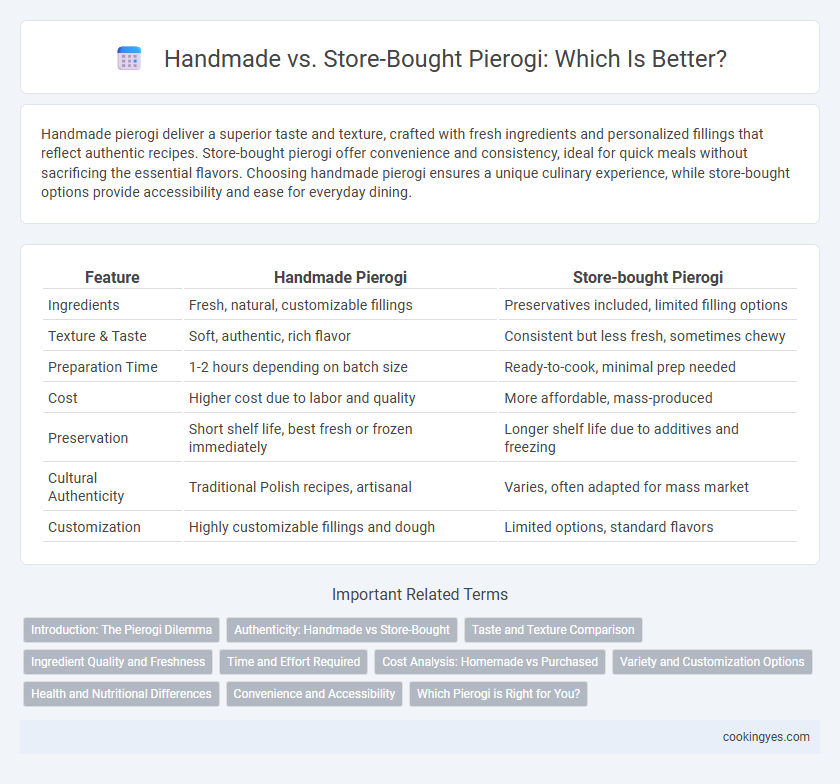Handmade pierogi deliver a superior taste and texture, crafted with fresh ingredients and personalized fillings that reflect authentic recipes. Store-bought pierogi offer convenience and consistency, ideal for quick meals without sacrificing the essential flavors. Choosing handmade pierogi ensures a unique culinary experience, while store-bought options provide accessibility and ease for everyday dining.
Table of Comparison
| Feature | Handmade Pierogi | Store-bought Pierogi |
|---|---|---|
| Ingredients | Fresh, natural, customizable fillings | Preservatives included, limited filling options |
| Texture & Taste | Soft, authentic, rich flavor | Consistent but less fresh, sometimes chewy |
| Preparation Time | 1-2 hours depending on batch size | Ready-to-cook, minimal prep needed |
| Cost | Higher cost due to labor and quality | More affordable, mass-produced |
| Preservation | Short shelf life, best fresh or frozen immediately | Longer shelf life due to additives and freezing |
| Cultural Authenticity | Traditional Polish recipes, artisanal | Varies, often adapted for mass market |
| Customization | Highly customizable fillings and dough | Limited options, standard flavors |
Introduction: The Pierogi Dilemma
Handmade pierogi offer unmatched freshness, authentic texture, and customizable fillings crafted to individual taste, enhancing every bite. Store-bought pierogi provide convenience, longer shelf life, and consistent quality, ideal for quick meal preparation. Balancing tradition and practicality shapes the ongoing pierogi dilemma for many home cooks and food enthusiasts.
Authenticity: Handmade vs Store-Bought
Handmade pierogi retain authentic textures and flavors due to traditional preparation methods and fresh ingredients, capturing regional culinary heritage. Store-bought pierogi offer convenience but often contain preservatives and lack the nuanced taste and delicate dough quality found in handmade versions. Choosing handmade pierogi ensures a genuine gastronomic experience that honors cultural authenticity and craftsmanship.
Taste and Texture Comparison
Handmade pierogi offer a superior taste and texture due to fresh, high-quality ingredients and careful craftsmanship, resulting in a tender, chewy dough with rich, well-balanced fillings. Store-bought pierogi often contain preservatives and fillers, leading to a denser dough and less flavorful fillings, which compromises overall mouthfeel and freshness. The artisanal process in handmade pierogi achieves a consistent, delicate texture and vibrant taste that mass-produced versions rarely match.
Ingredient Quality and Freshness
Handmade pierogi use high-quality, fresh ingredients like farm-fresh eggs, unbleached flour, and seasonal vegetables, resulting in superior taste and texture. Store-bought pierogi often contain preservatives and frozen fillings to prolong shelf life, which can compromise flavor and freshness. Choosing handmade pierogi ensures a more authentic experience with vibrant, wholesome ingredients.
Time and Effort Required
Handmade pierogi require significant time and effort, involving dough preparation, filling assembly, and careful folding, which can take several hours depending on quantity. Store-bought pierogi save time with ready-to-cook convenience, but may compromise on freshness and customization. Choosing between the two depends on the balance between culinary craftsmanship and convenience.
Cost Analysis: Homemade vs Purchased
Homemade pierogi tend to be more cost-effective per serving when factoring in bulk ingredient purchases like flour, potatoes, and cheese, versus store-bought options that include packaging and retail markup. The initial investment in homemade pierogi recipes and ingredient stock can lead to significant savings over time, especially for large batches. Store-bought pierogi offer convenience but often come at a higher price point per piece, limiting their cost-efficiency compared to preparing pierogi from scratch at home.
Variety and Customization Options
Handmade pierogi offer unparalleled variety and customization options, allowing for unique fillings such as wild mushroom, sauerkraut, or sweet cheese tailored to personal taste. Store-bought pierogi typically present standardized flavors like potato and cheese or pork, limiting the ability to experiment with diverse ingredients. Customization in handmade pierogi extends to the dough thickness and folding style, which is rarely achievable in mass-produced products.
Health and Nutritional Differences
Handmade pierogi typically offer superior nutritional value due to fresh, whole ingredients like unprocessed flour, organic vegetables, and quality meats, which retain more vitamins and minerals compared to processed store-bought options. Store-bought pierogi often contain preservatives, artificial additives, and higher sodium levels to extend shelf life, potentially impacting overall health negatively. Choosing handmade pierogi supports better control over ingredient quality and portion sizes, promoting a healthier diet rich in natural nutrients and fewer additives.
Convenience and Accessibility
Handmade pierogi offer authentic texture and fresh fillings but require significant time and skill, making them less convenient for quick meals. Store-bought pierogi provide easy access and fast preparation, ideal for busy individuals seeking traditional flavors without the effort. Frozen options ensure year-round availability, catering to diverse dietary preferences with minimal preparation time.
Which Pierogi is Right for You?
Handmade pierogi offer a unique texture and fresh flavor profile due to personalized dough thickness and fillings, ideal for those valuing artisanal quality and customization. Store-bought pierogi provide convenience and consistent taste, making them suitable for quick meals and easy preparation. Choosing between handmade and store-bought pierogi depends on your preference for authentic craftsmanship versus time-saving practicality.
Handmade vs Store-bought for Pierogi Infographic

 cookingyes.com
cookingyes.com